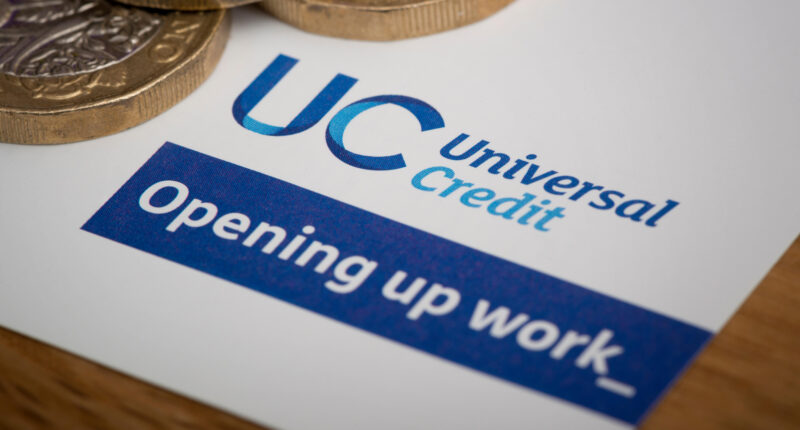THOUSANDS of disabled Brits face cuts to their Universal Credit payments.
Any savings held that are worth between £6,000 and £16,000 reduce the amount of Universal Credit eligible households can get.
Savings valued above £16,000 will make you ineligible for payments.
Around 4,000 disabled young people eligible for Universal Credit will end up getting lower payments because of this rule, according to BBC News.
This is because they have more than £6,000 in a child trust fund.
Those responsible for children who do not have the mental capacity to manage their own money must apply to the court to gain access to child trust funds (CTF).


This can often incur costs of hundreds of pounds and take many months to finalise.
Claire Catherall told the BBC that her 16-year-old son Ryan, who is autistic and has learning disabilities, is getting “penalised” for having savings.
She has paid in £25 a month into his account since he was born, so there is now £8,500 in the pot.
When Ryan turns 18 he will be eligible for Universal Credit, which is a benefit for people who are unable to work.
Most read in Money
But he will receive about £43 less a month as a result of having more than £6,000 in savings.
As Universal Credit is means-tested, any savings you hold are assessed and can affect your total benefit payments.
If you have £6,000 or less in savings, this won’t affect your claim for the benefit.
But any money saved over this amount that’s under £16,000 in total will be counted.
The money is treated as if you have a monthly income of £4.35 for each £250.
So with savings of £7,000, £17.40 will be taken off your monthly Universal Credit payment.
This rule applies to all types of savings, including those in CTFs.
These were long-term tax-free savings accounts for children born between September 1, 2002, and January 2, 2011.
The government gave eligible parents vouchers worth up to £500 to invest in these accounts which would grow in value before maturity when the account holder turned 18.
The cash can then be withdrawn and invested, saved or spent.
But if your child lacks the mental capacity to manage their account when it matures you’ll need to apply to the Court of Protection (COP) for a financial deputyship order so you can manage the account when they turn 18.
You’ll need to visit the government website to find out exactly what you need to fill in to apply for financial deputyship.
How did child trust funds work?
When CTFs became available, HMRC sent the parents or guardians of qualifying children a starting payment voucher of £250 (or £500 if they were on a low income).
This voucher could then be used to set up a CTF account in the child’s name.
If you didn’t use the voucher within one year, HMRC would set up a CTF account in your child’s name on your behalf.
Money in a Child Trust Fund account belongs to the child and is “locked in” until they turn 18.
There were three types of accounts that could be opened with the voucher:
- Cash Child Trust Fund: This is where you could make deposits just as you would for a bank or building society account, which can earn tax-free interest.
- Stakeholder Child Trust Fund: This is where the savings in the account are put into a wide mix of low-risk stock market investments.
- Shares-based Child Trust Fund: The savings in the account could be put into the stock market via an investment fund of your choice or select your own investments.
The savings would grow over time thanks to tax-free returns.
How can you claim child trust funds?
A CTF matures on the account holder’s 18th birthday.
At this point, the child automatically takes over the account and no more money can be added – unless they have the mental capacity to do so.
Until your child withdraws or transfers the money, it stays in an account that no one else has access to – unless you apply for financial deputyship to help make a withdrawal.
If you are one of the tens of thousands of young adults who haven’t claimed their account, the government has an online tracing service where you can find out if you have one and which provider it’s with.
To find out more, you’ll need a government gateway login and National Insurance number.
If you are a parent looking to find out about your child’s fund you can either access it online, or you’ll need to send a letter to HMRC with the following details:
- Full name and address
- Child’s full name and address
- Child’s date of birth
- Child’s National Insurance number or Unique Reference Number if known
What can you do once you’ve claimed the money?
While it might be tempting to spend all the cash at once, there are other options available to you.
Households can request the cash directly to their bank account, transfer it into an ISA or invest it.
Here are the full details of what can you do.
Cash it in
You can ask your CTF provider to hand over the money and get it paid into a bank account.
You’ll need to share the bank account details you wish to transfer the cash into with HMRC.
Remember you’ll need to be at least 18 before you can cash out the savings.
Transfer it into an ISA
You can transfer it into an ISA.
An ISA is an Individual Savings Account and you don’t pay tax on the interest you earn in these types of accounts.
You can have a cash ISA – although the interest rates on these are typically lower than a standard savings account – or a stocks and shares ISA, which lets you invest the money if you don’t mind taking some risk.
A good option for young people saving to buy their first home is the Lifetime ISA.
You can stash £4,000 a year into these accounts and the government will give you a 25% bonus on your savings as long as you use it to buy your first property, or if you wait until retirement age to access the cash.


It won’t incur income or capital gains tax and will sit until the account holder does something with it.
This isn’t a great option though as your money won’t be earning interest, which means its value in real terms is often eroded by inflation.










